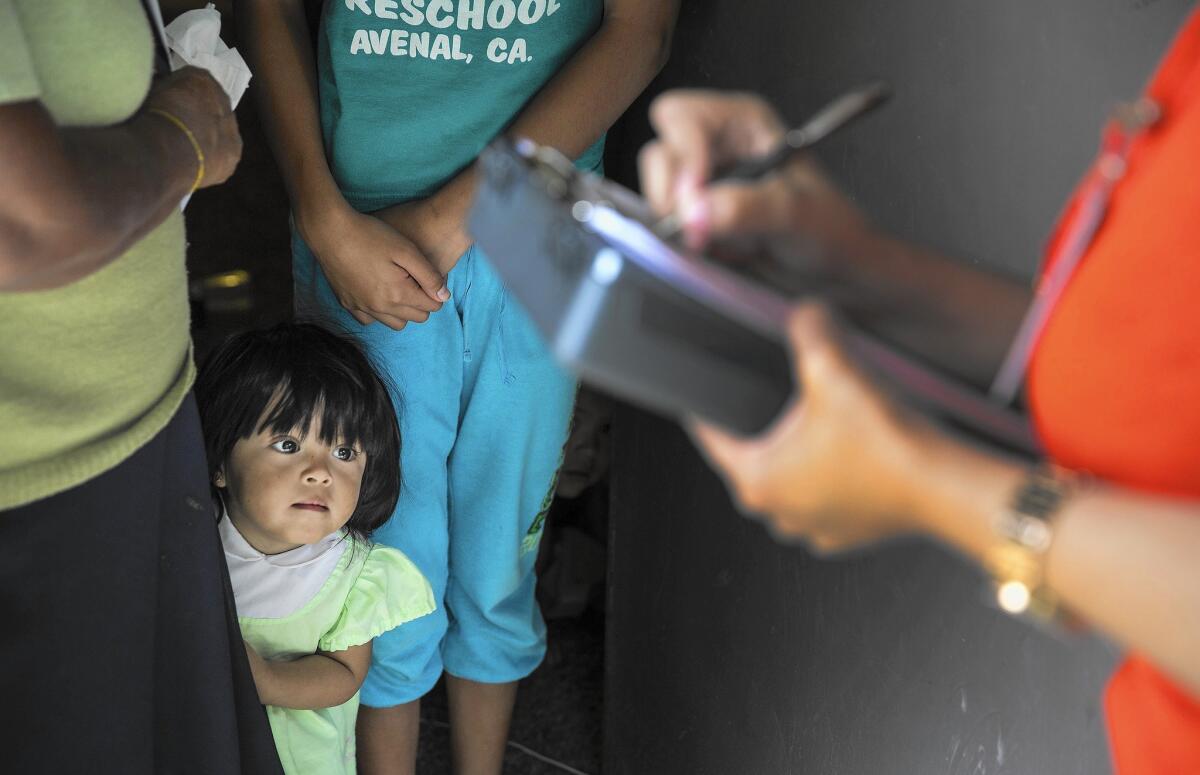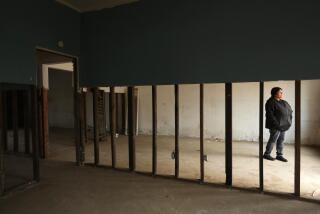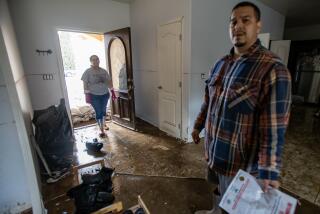Where the drought has brought Head Start to a stop

A plush Cookie Monster wearing overalls and a sparkling pony ridden by a doll with one eye permanently shut huddled against a living room wall with a contingent of other orphaned toys.
Diana Toscano picked up a child’s hat with a yellow puppy stitched on the front. She shook her head as she navigated around coloring books, puzzles and toy cars in the dirt-caked homes at the once-bustling farmworker camp.
“They had kids. They had little kids. Lots of little kids,” Toscano kept repeating to herself.
The gutted cinder-block homes slated for demolition in the western Fresno County town of Five Points are a haunting symbol of Toscano’s struggle during one of the worst droughts in California’s history: finding enough children to keep the local Migrant Head Start Center from shutting its doors.
On this recent summer day, Toscano and fellow staffers Rita Solorio and Araceli Perez had piled into the center’s minivan, traversing dusty roads where oleanders withered and farmland that once exploded with tomatoes, garlic and onions lay fallow. Signs screaming about the drought and other water issues flashed by: “No water = No jobs.”
“The kids have left. Look at all the families that had to leave this area because there is no water,” Toscano said as she toured the abandoned homes. “They could have been at our center.”
::
The federally funded Migrant Head Start centers provide free child care and developmental services for the children of migrant farmworkers, but at least two in Fresno County are in jeopardy of not reopening next farm season. Another, in the small town of Biola, closed this year.
Fresno Head Start Director Flora Chacon said there simply weren’t enough children to justify keeping it open.
Unable to find field work, the farmworker families who usually migrate and follow the harvests left Biola and its surrounding areas early this season or simply didn’t arrive because the drought has left the fields barren, Chacon said.
Two years ago, the Five Points center served 38 children, she said.
“We used to have a line out the door,” Chacon said. “There was a waiting list.”
Now the center serves 19 children with nine staff members — including four teachers. If enrollment were to fall any lower than 14, the center would be in jeopardy of closing.
In response, Migrant Head Start has stepped up recruitment, knocking on doors and scouring migrant labor camps in a desperate search for children.
Their futures are at stake too. There’s a good chance they may lose their jobs if attendance doesn’t pick up.
Over lunch at a Denny’s, the women discussed their Plan B.
Toscano, who does most of the recruiting, said she may move to Colorado. She has family there and, more important, “there’s water over there,” she said.
Perez, the center’s director, said her husband, who serves as a foreman, was without work this spring because of the drought. She has family in Oklahoma, and they could help her get work there, she said.
Solorio, a janitor at the center, said she’s holding out hope that enough children will attend but would like to open up a day-care center if the program ends.
Ana Maria Covarrubia works part time at Five Points’ post office. The 27-year-old mother of two girls — a 4-year-old and a 3-month-old — said she doesn’t know what she’ll do if the center closes.
“I feel comfortable leaving them here. I know they are in great hands,” she said. “It definitely concerns me if they close it down. Will I be able to keep my job — the only job that’s left around here?”
::
The Five Points trio hoofed it into trailer parks with crunchy yellow lawns. About the only green in sight came from waxy faux plants on a porch or two. The women knocked on every door. They got excited when they saw a bicycle in a courtyard or a booster seat in a parked car.
“This used to be romaine, butter lettuce,” said Solorio, who used to pick tomatoes and other vegetables in the area.
Behind a stand of eucalyptus trees and a dusty courtyard, Solorio spotted gold.
“There are toys here!” she yelled at the other women, gesturing at a little yellow truck.
Toscano knocked on the door. A teenage boy answered.
“Good day. Is your mother home?” Toscano asked in Spanish. “We’re from the school at Five Points.”
Carmen Gonzalez came to the door.
“I’m the grandmother,” said the 64-year-old, who was visiting from Mexico.
Stephanie, 1, clung to her grandmother’s leg.
Perez gave her best pitch. “We have good teachers. You need to rest. We can even come pick them up in a bus,” she said in Spanish.
Solorio chimed in: “Everything is free. If they’re still in diapers, the diapers are free.”
The grandmother looked convinced and promised to speak with the parents, who were out picking tomatoes.
Before they left, they handed Gonzalez a green bandanna with the center’s phone number. In exchange, the women collected the parents’ phone numbers.
“We hit the jackpot,” Toscano said. “This makes us happy.”
But that would be the most promising lead they’d get all day. At another residence in the same trailer park, nobody was home. They left a flier on the door.
Perez looked around the courtyard, spotting a rusted-out truck.
“There’s nowhere to play,” Perez said. “We try to get them in a learning environment.”
A mourning dove cooed from above. The clouds gathered and grew heavy. Rain began to fall.
“Do you feel it?” Perez asked the other women.
Toscano stretched her arms to the sky. “It feels good.”
She wiped away a droplet on her forehead. “It’s about time it’s raining,” she said. “We need the rain. I know it’s just a little bit, but anything will help.”
It lasted less than five minutes — just enough to dirty the minivan’s windshield.
::
In Huron, about a 15-minute drive south, Modesta Bautista pounded the dust off her work boots before making her way inside her home.
Most of the ranch-style house was empty. A kitchen table with chairs, a television, a sofa and a sprinkling of toys strewn across the carpeted floor were the only items in the living and dining rooms she shared with another family.
The 33-year-old doesn’t own much because she and her husband don’t like to haul a lot when they follow the harvests. Every year for six years, the family has traveled to Salinas to trim lettuce in the winter and then to Huron to pick tomatoes, garlic and onions in the summer.
Her four children enveloped her with smiles and hugs. She’d arrived well before dinner today, again. It didn’t use to be that way.
This time of year, harvest time, she’d usually pull 10-hour workdays, seven days a week. Now, she’s lucky to get eight hours a day, six days a week.
Bautista, whose 3-year-old son attends the Migrant Head Start Center in Huron, has started thinking about just staying put when the family returns to Salinas this winter.
“We just can’t save money anymore. If there is an emergency and one of the children falls ill? What do we do?” she said. “We just live day by day. It’s just enough to pay rent, baby-sitting and bills.”
Back at the abandoned farmworker homes in Five Points, the women from the Head Start program made their way past a sun-bleached infant swing in an overgrown pasture.
“It was a good day,” Perez said. “We found some kids.”
MORE ON THE DROUGHT:
Innovation is blooming at water-wise urban farms
Treasures revealed as California drought drains lakes
Hospitals look for ways to cut water use during California drought
More to Read
Start your day right
Sign up for Essential California for news, features and recommendations from the L.A. Times and beyond in your inbox six days a week.
You may occasionally receive promotional content from the Los Angeles Times.






